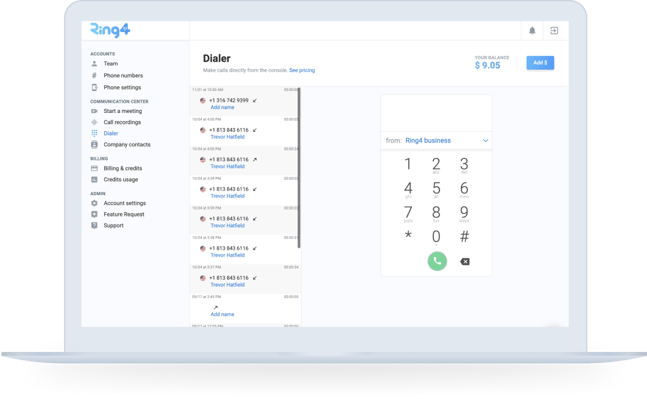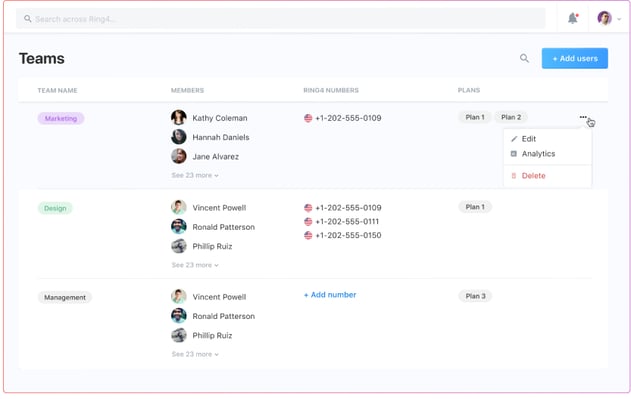The Ultimate
Small Business Communication
Guide 2.0

Introduction
By now, you've probably heard several stories of small businesses that have grown into multi-million dollar companies due to their hard work and perseverance. What you may not realize is that a primary component of growth is effective communication.
What can the success stories, and perhaps even the failures, teach us about communicating in our own business? To keep your business running smoothly and growing successfully, every employee, team member, vendor, partner, manager etc… needs to understand what they need from each other and have a means of conveying that message swiftly and effectively. In truth, a suitable communication system can make all the difference to a thriving and happy workplace.

To that end, we've put together this ultimate guide on how to communicate effectively in your own small business. You'll learn about the critical components of solid communication at your company, how to communicate with customers, and improve internal communication.
You'll also find out how to implement an excellent communication system so you can grow your small business into a thriving empire.
So let's get started - the first steps are often the hardest!
What is Business Communication?

Business communication is the process of sending and receiving messages between individuals, groups, or organizations to share information.
Without communication, each person in an organization would have to figure out their own way to do each step in getting a job done - and they might not necessarily choose to do it in the way you would prefer. What’s worse is that if you have a lot of people doing the same task differently, there’s no guarantee that everyone is doing it most efficiently.
That is why we use language and actions to convey the best means of accomplishing everything that is necessary for a business to run like the well oiled machine needed to scale up. In other words, it’s imperative to talk to each other about how our jobs contribute to the business's success.
When your team can communicate effectively, they can work together to solve problems and figure out new ways of doing things that will benefit your business in the long run.
In today's digital age, we're inundated with communication - texts and emails fly through the air at record speeds, and news spreads like wildfire on social media.
But just because we have an increasing number of platforms to use and a rapidly growing population to talk to doesn't mean that those messages are actually being received or being acted upon.
Gone are the days of paper memos and traditional landlines (although that last one is still alive and well in some corner offices).
Today's communication systems are digital, and there's no limit to the number of ways your employees can communicate with each other.

Why Are Effective Business Communication Systems so Important?

Having a powerful communication system in place can help your small business grow, retain customers, increase the efficiency of your employees, and correct errors before they affect the entire company.
When you communicate effectively with each other, everyone will be on the same page about what needs to happen for the good of your small business - which means more happy customers and a more productive, efficient team.
Turn Prospects into Customers
It is unfortunately quite easy to lose potential customers when you don't have the proper communication channels in place. Customers don't want to waste time on hold or being transferred to various departments when they have a question or concern.
If you want to ensure that customers stay happy and loyal, you need to provide them with the resources they request help or have questions.
Having an effective communication system in place means that every customer who has a question can get their problem solved quickly and easily–the chances of losing a customer increase drastically if they have a concern or question that goes ignored.
Opportunities Come From Great Communication
Proactive communication is essential for customer care, but it's also the key to gathering new business. When customers have great interactions with your company, they are more willing to refer their friends and family.
They are also more likely to purchase something they didn't know they needed if you do a great job of communicating the benefits of your product or service.
When customers can tell their friends about how helpful, knowledgeable, and kind your customer care team is, you'll begin to increase sales.
Never Miss an Opportunity
Having an excellent communication system in place helps you to take advantage of opportunities as they arise. Whether the opportunity is a simple request for information or a chance to collaborate with another business, you'll never know what could come from a simple conversation.
Your employees will be more productive if they can easily work together to take advantage of opportunities that present themselves. When everyone is on the same page, your small business can grow faster and significantly impact those you serve.

By having an organized and accessible communication system, your team can be confident that they'll never miss an opportunity to serve customers or increase sales.
When put into practice, employees can utilize VoIP to always be on the same page. A simple internet connection allows customers and employees to stay connected regardless of where they are in the world.
Don't Overwhelm Your Team
If you have a small business, chances are the team is already overwhelmed with all of their everyday responsibilities. This means if they get overbooked, things will start falling through the cracks.
It's essential to have a way for your team to communicate and be on the same page without overloading everyone with endless tasks and responsibilities.
The communication system will help them serve your customers better and decrease the chances of overbooking your employees.
Employee Productivity Increases
When you take the time to get everyone on the same page, it's easier for your employees to share information and collaborate to increase productivity.
Employee satisfaction is vital for company morale - which can be an issue when you don't have the right tools in place. A proper communication system is essential for keeping your employees connected and actively helping customers and other stakeholders.
Take advantage of communication systems like instant messaging, video conferencing, and VoIP to make sure everyone is on the same page with the information they need when they need it. These collaborative communication methods can help your team work efficiently and effectively.
Reduce the Risk of Overspending on a Communication System
Having the right communication system isn't going to help your small business grow if you don't have a way of paying for it. The first step is finding a solution that fits your budget and has the features to create a truly effective workflow for your business.
Before you pay for phone service or VoIP, make sure you're getting what you want at a price that won't break the bank. There are many options for companies looking to get more from their communication system, but some can be expensive.

Ring4 offers affordable VoIP services with all the features your small business needs. But we’ll share more about that later. To learn more about why effective business communication systems are so important, read this post on the Ring4 blog.
Understanding the Different Channels of Business Communication

Three main areas of communication occur in your small business that each has different needs. These three channels of communication include internal, external, and customer service.
Internal communication includes employees who work together or collaborate, external communication is with customers and suppliers, and customer service is communicating with existing or potential clients.
Two Types of Communication Technology
With a modern communication system, you can utilize two main communication channels in your organization's workflow. These two channels of communication include VoIP and chat.
A Brief Look at VoIP
VoIP stands for Voice over Internet Protocol. This communication method allows customers and employees to communicate with each other no matter where they are in the world. VoIP also gives you several features for your small business at a price that won't break the bank.
VoIP is a service that allows your employees to communicate without being tied down by phone lines or directories. By utilizing VoIP, you'll have the ability to see when others are online and reach them directly with one click of a button.

VoIP also allows customers to reach the correct department without getting passed around from person to person. With the ability to automate call routing and communication, your business communication system can make more effective communication decisions.
A Brief Look at Chat
With chat, employees will communicate directly with each other through personal or group messages. This can be very useful for small businesses that need to work closely together and don't have the time to wait for emails or phone calls.

Chat can be used both internally and externally. You'll be able to get in touch with anyone on your team without impacting their schedule while making sure you're getting what you need when you need it.
Chat is also a great line of communication for customers and suppliers. Customers will be able to contact your company, and you'll be able to get back to them quickly. This can help you boost your image as a transparent business that cares about the customer experience while also helping you close more sales and retain loyal customers.
What to Use For Internal Communication?
When it comes to internal communication, it's crucial to find a solution that gives you the features you need but is also effective. Chat is an excellent solution for small businesses that need to work closely together.
A chat platform can be used to help employees collaborate on projects, communicate with higher-up executives without interruption, and keep them up-to-date on projects.
It also allows groups to communicate in one place, especially if your business has remote employees or if you have multiple sites. Conversations can be specific to branches or regions, making internal communication more effective.
What to Use For External Communication?
When communicating with non-workers, it's essential to ensure that the highest quality of service is available for all parties involved. For external communication, VoIP is a great solution. It allows your employees to communicate with partners, customers, and suppliers no matter where they are in the world.
VoIP ensures that high-definition sound is transmitted quickly and effectively. With VoIP, you'll be able to collaborate on projects with suppliers and customers in real-time while ensuring that their needs are being understood.
A good VoIP system also gives you the ability to track calls placed internally or externally. You can even integrate it with your CRM systems, so you better know who needs to be called and when.
What to Use For Customer Service?
Customer service is a necessary aspect of business communication because it's the face of your company. Your customer service representatives act as liaisons between your organization and customers, and their experience can either turn a customer into a repeat customer or drive them away for good.
When it comes to excellent customer service, a combination of chat and VoIP works best. Chat allows customers to quickly get in touch with your customer service representatives, while VoIP ensures that inbound callers get a consistent, high-quality connection with the right person.

Supporting customers by chat and VoIP ensures that they can communicate with your business across all channels. It also allows the customer to choose how to interact with your business.
Understanding how to effectively choose the right communication channel can help you boost the operational efficiency of your small business. Taking control of your communication will also help you and your employees be more productive and responsive to customer needs.
What Are The Various Types of Communication in Business Management?

There are many different business channels of communication your business management can use. With so many available, it's important to find the right combination of tools for your company because one size doesn't fit all.
The priority of each business channel will vary based on what you need to share and who you want to communicate with. The four primary business communication channels are horizontal, vertical, internal, and external.
Horizontal Communication
Horizontal communication allows your staff in similar positions to communicate with parallel branches and share information.

Communicating across a business is essential for a small organization because it can help teams collaborate and work together. To effectively communicate horizontally, you need a chat platform that allows users from different departments to connect.
When using a chat system, you can create channels for each department, allowing employees to talk about what matters most. If you want to communicate directly with someone, you can simply add them to a chat conversation.
Vertical Communication
Vertical communication is the most common form of business communication and allows direct relationships with people in a leadership role.
When you're communicating upwards, you want to ensure that you're sending relevant information that your management team needs. Because of the multiple layers of management, it may be challenging to communicate effectively, and you can easily overload managers with information.

Here's a scenario: You're sending an email to your CEO because there was a slight delay in one department. Your manager receives this email and nine other managers who sit above him. This unnecessary communication may cause confusion, resulting in you having to explain it in length to one or more managers.
A chat group specific to managers can help employees communicate more effectively by sending information to the right person. This also allows them to communicate with different departments about relevant issues only to their group or location.
Internal Communication
Internal communication is important for any organization because it helps your employees stay connected and understand the direction of their department and company as a whole.
When employees communicate internally, they're able to build stronger relationships with coworkers who may hold similar positions or are in the same department. This internal communication can also help managers work closely with their teams to deliver more effective results.

Similar to how internal communication works for managers, you should use a chat system that allows employees across different locations to connect and communicate with each other.
External Communication
After you've set up the proper business communication channels internally, it's time to think about how you communicate with clients and customers.
Communicating effectively with your clients is required for building lasting relationships, creating loyalty, and generating more business.

When communicating externally, it's important to use the fitting tools and find the right way to use them. The right VoIP service can help you connect with clients through phone calls and chat messages.
Choosing tools that increase the efficiency of your communication will save time and improve the quality of your business communication. Understanding these different communication channels is the first step towards building a foundation for effective business communication.
Learn more about the four different types of business communication here
What is a Virtual PBX?

A Virtual PBX system is similar to the service provided by a traditional phone company, except that it's available through VoIP. The difference is that the "phone" part of the Virtual PBX uses internet technology instead of copper wires.
This means that you can use your VoIP provider to connect everyone in your organization, even if they're in different locations. For example, if your employees have smartphones, they can use this service to stay connected to the office while on the go or working remotely.
A PBX can work wonders for your business communication by allowing everyone to stay connected and collaborate. There are many benefits to using a virtual PBX that your organization can take advantage of.
Why Use a PBX Over a Traditional Phone System?
You'll get more than just a phone number with a virtual PBX system. It provides features built with business communication needs in mind.
Some of these include:
- Use your existing devices to make calls
- Connect everyone in your organization
- Use it when working remotely
- Automatically route customer calls
- Integrated chat
- Build remote teams and call centers

These are just some of the features of a virtual PBX. When choosing one, you'll want to pay attention to the features that will help your organization communicate more effectively and focus on building stronger relationships with your clients. Ring4 offers a wide range of features at an affordable price to help you accomplish this.
Increased Productivity
By using a Virtual PBX, it's easier to stay connected and increase productivity. Instead of having multiple devices or systems that can't coordinate with each other, employees can make calls from their desks as well as anywhere else. Using a Virtual PBX also means you don't have to worry about landlines.
Increased Collaboration
Internal communication becomes easier when employees connect through phone calls or chat messages. This allows them to work more closely together, increasing the speed of projects while also enhancing collaboration among teams in different locations.

Having a Virtual PBX also means that your customers can easily connect with you. For example, if they have an issue that needs attention from the IT department, they can quickly contact someone from IT using a dedicated entry on the phone system to route their call. This feature creates a better experience for them and improves client relationships.
Saves Time
Another benefit of virtual PBX is the time it saves. If you have employees in different locations, chances are they'll need to connect regularly. Instead of having them try to coordinate meetings or calls across multiple platforms, all your employees can use a single tool that allows everyone on the team to stay connected.
Protects Everyone's Information
Data loss prevention is another advantage Virtual PBX has over a traditional phone system. Having a virtual system, you can record calls and keep your data safe while being more easily accessible.
You can also track data to make informed decisions about what is working and what isn't. Plus, only the information you want to share is available externally with a cloud-based system.

Top 5 Ways To Effectively Manage Small Business Communication

There are many different ways for a business to communicate, but not all are made equal. Being able to quickly and effectively manage your internal communication or client requests is essential for the long-term growth of your small business.
These five tips will help you manage your communication more effectively and help increase the revenue of your business.
1. Choose a Good Inbound Calling System
Your inbound calling system is the first place that people will try to get a hold of you. Suppose you're not running a business with automated call routing. In that case, this can be both annoying and frustrating since customers might become frustrated and find it challenging to get the support they need.
Choose a Virtual PBX platform with a satisfactory inbound calling system to avoid these problems. This will not only help your customers, but it may improve your retention rates and profits too.
Click here to read the seven best practices on inbound call handling.
2. Keep Internal Communication Open
Internal communication is essential to any small business because it helps establish trust between employees and the company at large, speeds up productivity, and increases collaboration among teams in different locations.
However, it's essential to keep in mind that maintaining open communication with employees can be difficult during times of transition or growth. If these changes are handled poorly, they could cause high turnover rates and lower morale.
To ensure this doesn't happen, implement a process for increased internal communication during these times, so you don't lose the best employees for your business.
3. Use a Communication Platform That's Easy To Manage
An influential part of effective communication is also being able to communicate with your clients clearly, which means you need a platform that is easy to use.
When choosing a Virtual PBX system, ensure it has all the features needed to route calls to your employees and track their progress easily. This will help you manage client requests more effectively without wasting time figuring out how to use the system.

4. Track and Leverage Data
One benefit of being a small business owner is having more control over your direction and decisions. When choosing a communication platform for your small business, find one that can easily collect and analyze data so you can make informed decisions about what direction to take.
This will give you a competitive advantage over other businesses in your field by helping you better understand your customers. Plus, it gives you the chance to discover how to make your employees more effective.
5. One Phone Number Avoids Confusion
We've all had that frustrating experience of trying to call a company and getting sent around in circles before you get to the person you need.
You can solve this confusion by having one phone number for your business, including features like directory assistance, automated routing, and easy call management.
These five tips are just some of the many ways you can manage your small business communication needs.
Learn three more ways to effectively manage small business communication in this post.
7 Best Communication and Collaboration Tools for Small Businesses

Having the right business tools can make a big difference in how your small business operates.
1. Ring4

Ring4 makes it easy for your small business to become more productive and efficient by giving you the features you need to collaborate with clients and team members.
Ring4 gives your business the edge it needs with communication features that include chat, a VoIP Phone System, Video Calls, and much more.

2. Slack

Cloud Talk offers many key features that would be ideal for a call center or sales team. These features include call tagging, call notes, real-time customer cards, and speech-to-text. These features can be great for your team to take notes and keep key insights about your customers.
You can track your team's call results and compare them with other team members with real-time analytics. This is very helpful when paired with one of their integrations like Salesforce.
3. Taggg

Taggg is one of the top online schedulers for businesses, making it easy to book appointments and client meetings without the hassle of contacting clients individually.
This scheduling platform also syncs easily with other business tools like Ring4 and Slack, so you can communicate with clients in an instant without needing to switch systems.
4. Trello

Trello gives small businesses the ability to easily create and manage their projects with its simple layout and format. It's easy to keep track of what needs to get done and who should be doing it, which can help boost productivity and avoid frustrations.
5. GoToMeeting

GoToMeeting is an outstanding tool for communication because it allows you to host video teleconferences, webinars, and more.
This platform also allows everyone to view presentations on their computers or mobile devices since they can save recordings of your meetings for future reference.
6. ProofHub

If your business requires project management software, ProofHub can help. This platform allows small businesses to create timelines, assign tasks, track progress, and collaborate with clients on projects without relying on third-party services or spreadsheets.
7. Toggl

This tool is perfect for online tracking and monitoring, with a time-tracking feature that makes it easy for you to track your employees' work hours and how much they're producing.
This can help you find out who is most productive in the office to delegate tasks better. It also helps keep everyone accountable for their own time, which is essential when everyone puts in long hours in a small business environment.
These seven tools can help your small business communication become more efficient and effective. We share three additional tools in our post 11 Best Communication and Collaboration Tools for Small Businesses. Read it here.
Choosing the Right Communication System for Your Business

When choosing the right communication system for your small business, you should consider what types of features and tools it offers. Get a communication system that is affordable, easy to use, and scalable.
Look for one with integration capabilities, so you don't have to switch between different systems. In addition to those features, your communication system should have call recording and video conferencing so you can provide your employees with crucial training for their jobs.
Make sure the system is mobile-friendly so your team can communicate from anywhere at any given time.
We’ve alluded to it several times throughout this guide, but Ring4 is the ideal phone system for small businesses. Not only does it help your small businesses become more productive and efficient, but it also equips your organization with all the features you need to collaborate with clients and team members. Just some of the in demand features Ring4 has to offer include a VoIP Phone System, Video Calls, chat, Scheduling Tools, Integrations, and so much more.

This affordable communication system has unique features that every small business owner needs. Ready to set your business apart? It’s high time you come into the age of modern communication with Ring4. Sign up today, and see why businesses nationwide are ditching their landlines for the business phone you can set up in minutes on your smart device.
The Ultimate Small Business Communication Guide 2.0
Get our free guide on successful business communication.

Table of Contents
- 1. What is Business Communication?
- 2. Why Are Effective Business Communication Systems so Important?
- 3. Understanding the Different Channels of Business Communication
- 4. What Are The Various Types of Communication in Business Management?
- 5. What is a Virtual PBX?
- 6. Top 5 Ways To Effectively Manage Small Business Communication
- 7. 7 Best Communication and Collaboration Tools for Small Businesses
- 8. Choosing the Right Communication System for Your Business
